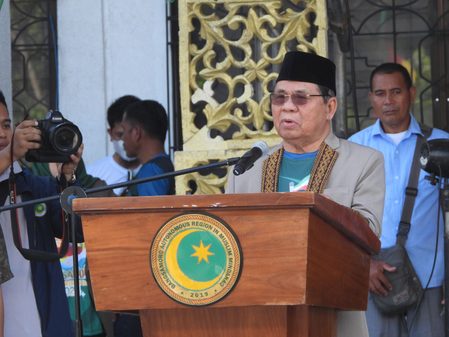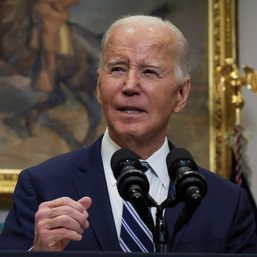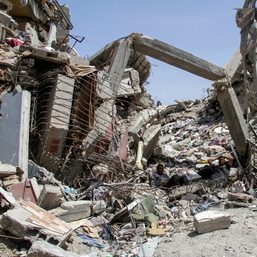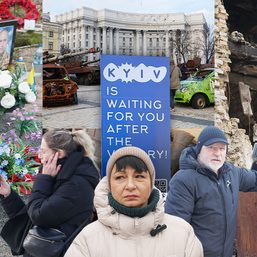SUMMARY
This is AI generated summarization, which may have errors. For context, always refer to the full article.
![[OPINION] The BARMM must address intersecting climate and conflict risks now](https://www.rappler.com/tachyon/2024/02/ispeak-barmm-climate-change-feb-9-2024.jpg)
As humanitarian researchers exposed to different crises globally, we have seen how climate change exacerbates social, political, and environmental vulnerabilities — especially in fragile contexts already prone to conflict. This is becoming more evident in the Bangsamoro Autonomous Region in Muslim Mindanao (BARMM), the region with the highest poverty incidence in the Philippines, which faces immense challenges from climate change, conflict, and environmental degradation that threaten stability and development.
BARMM communities have long struggled with armed groups, clan tensions, natural resource depletion, and poverty. Climate hazards like typhoons, flooding, and drought threaten livelihoods and contribute to resource scarcity. These overlapping stressors occur while a fragile peace process occurs in hopes of stabilizing the region.
Limited resources constrain the ability of the BARMM’s transitional government, the BTA, to respond to climate impacts. The transition period will end in 2025 with elections that could shape the region’s future stability. So, the BTA must consider climate change now.
To better understand the risks posed by both conflict and climate change in the region, humanitarian, climate, and peace experts recently convened at a workshop organized by the Harvard Humanitarian Initiative and Mindanao State University-Iligan Institute of Technology in Iligan City, Mindanao to discuss climate change impacts on conflict dynamics and how collaboration across sectors is key to solutions moving forward. Their insights offer lessons for BARMM governance and support for vulnerable communities.
Context matters
One of the key issues highlighted at the workshop was the political, economic, social, cultural, and environmental differences within the BARMM that must be taken into account when addressing climate change, and environmental and conflict impacts.
For example, Maguindanao is dealing with violent land disputes over the Ligawasan Marsh, which is home to a rich biodiversity of species that supports the livelihoods of more than 300,000 people. Illegal fishing, deforestation, development of agricultural land, dumping of solid waste, and a changing climate threatens the marsh’s resources which could impact livelihoods and increase the potential for unemployed youth to join non-state armed groups.
Lanao del Sur and communities around Lake Lanao face displacement, poverty, and resource depletion from large-scale conflicts like the Marawi siege and rido or clan feuds, as well as climate change impacts. The lake, which provides key resources and livelihoods, is at risk of depletion from climate change, illegal mining, and logging. While the Ranaw Development Authority aims to protect Lake Lanao’s resources, all contextual factors must be considered regarding the simultaneous impacts of conflict, degradation, and climate change.
Although both provinces face intersecting challenges, the contexts and risks vary greatly between them, requiring different policy and practice approaches. Furthermore, a community’s individual experience of the compounding challenges must be understood to adequately address them. One-size-fits-all solutions will not work given the contextual differences of the BARMM.
A need for community-level data
Speaking of communities and contextualization, government policies and NGO programs require an understanding of local attitudes, concerns, and aspirations related to these issues. Gaining insights directly from communities across the BARMM can fill knowledge gaps and provide information on how residents perceive and experience overlapping climate and conflict risks. This local, community-level approach would ensure policies and interventions do not exacerbate vulnerabilities or tensions.
Unfortunately, climate data is limited in the BARMM, hindering informed decision-making of government and humanitarian actors. Without reliable local evidence, well-intended actions could harm communities or be ineffective.
To adequately address BARMM’s complexity, decision-makers must use community-level data to consider how climate impacts intersect with peace-building and resource sustainability. This contextualized information from impacted areas is needed for effective and equitable responses.
In addition, collaboration across sectors that is inclusive of women, indigenous peoples, people living with disabilities, and religious leaders is needed in the shaping of development policy and programming. Key stakeholders from local government, humanitarian and development agencies, climate and environmental professionals, and peace-building efforts must be sensitive to one another’s work and approaches to avoid inadvertently exacerbating local conflict dynamics. Holistic solutions are needed.
The way forward
With elections looming in 2025, the BTA has a critical window to establish climate-sensitive foundations for lasting peace. But community-level, evidence-based, collaborative action is urgently needed. This is crucial especially that the communities’ safety and livelihoods depend on the support they get and their own ability to cope with intensifying and intersecting climate, conflict, and environmental risks. Thus, understanding local realities through data and inclusive dialogue should shape how the BARMM government addresses this complex challenge for a future that is stable, at the very least. – Rappler.com
Kendra Sterneck is a Graduate Research Assistant of the Program on Resilient Communities at the Harvard Humanitarian Initiative (HHI) and a Master of Public Health student at the Harvard T.H. Chan School of Public Health.
Vincenzo Bollettino, PhD is the Director of the Program on Resilient Communities at HHI and a Senior Research Scientist in the Department of Global Health and Population at Harvard T.H. Chan School of Public Health.
Add a comment
How does this make you feel?











![[OPINION] Unjust wars and a just peace](https://www.rappler.com/tachyon/2024/03/tl-unjust-war-just-peace03262024.jpg?resize=257%2C257&crop_strategy=attention)
There are no comments yet. Add your comment to start the conversation.